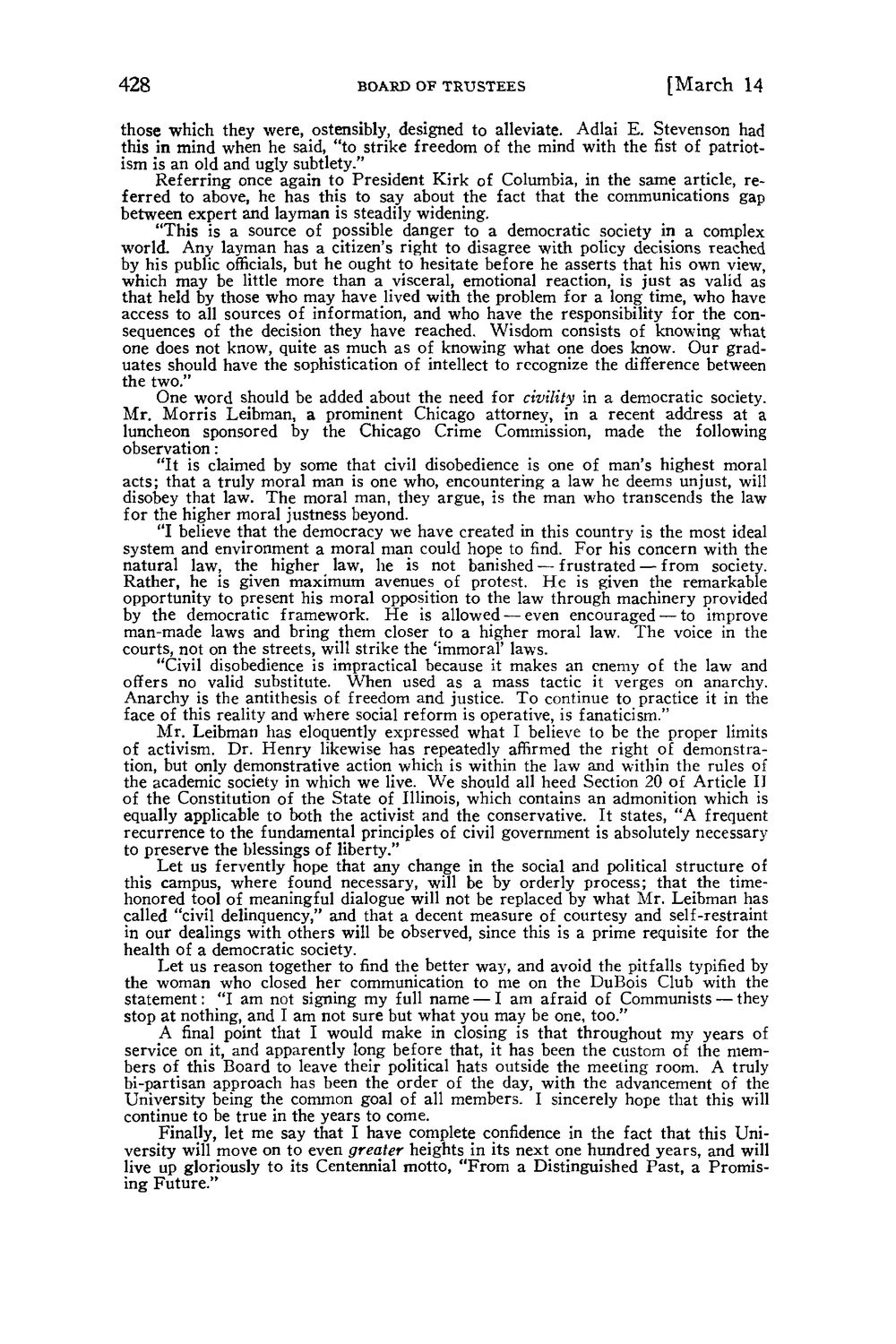| |
| |
Caption: Board of Trustees Minutes - 1968
This is a reduced-resolution page image for fast online browsing.

EXTRACTED TEXT FROM PAGE:
428 BOARD OF TRUSTEES [March 14 those which they were, ostensibly, designed to alleviate. Adlai E. Stevenson had this in mind when he said, "to strike freedom of the mind with the fist of patriotism is an old and ugly subtlety." Referring once again to President Kirk of Columbia, in the same article, referred to above, he has this to say about the fact that the communications gap between expert and layman is steadily widening. "This is a source of possible danger to a democratic society in a complex world. Any layman has a citizen's right to disagree with policy decisions reached by his public officials, but he ought to hesitate before he asserts that his own view, which may be little more than a visceral, emotional reaction, is just as valid as that held by those who may have lived with the problem for a long time, who have access to all sources of information, and who have the responsibility for the consequences of the decision they have reached. Wisdom consists of knowing what one does not know, quite as much as of knowing what one does know. Our graduates should have the sophistication of intellect to recognize the difference between the two." One word should be added about the need for civility in a democratic society. Mr. Morris Leibman, a prominent Chicago attorney, in a recent address at a luncheon sponsored by the Chicago Crime Commission, made the following observation: "It is claimed by some that civil disobedience is one of man's highest moral acts; that a truly moral man is one who, encountering a law he deems unjust, will disobey that law. The moral man, they argue, is the man who transcends the law for the higher moral justness beyond. "I believe that the democracy we have created in this country is the most ideal system and environment a moral man could hope to find. For his concern with the natural law, the higher law, he is not banished — frustrated — from society. Rather, he is given maximum avenues of protest. H e is given the remarkable opportunity to present his moral opposition to the law through machinery provided by the democratic framework. H e is allowed — even encouraged — to improve man-made laws and bring them closer to a higher moral law. T h e voice in the courts, not on the streets, will strike the 'immoral' laws. "Civil disobedience is impractical because it makes an enemy of the law and offers no valid substitute. When used as a mass tactic it verges on anarchy. Anarchy is the antithesis of freedom and justice. To continue to practice it in the face of this reality and where social reform is operative, is fanaticism." Mr. Leibman has eloquently expressed what I believe to be the proper limits of activism. Dr. Henry likewise has repeatedly affirmed the right of demonstration, but only demonstrative action which is within the law and within the rules of the academic society in which we live. W e should all heed Section 20 of Article II of the Constitution of the State of Illinois, which contains an admonition which is equally applicable to both the activist and the conservative. It states, "A frequent recurrence to the fundamental principles of civil government is absolutely necessary to preserve the blessings of liberty." Let us fervently hope that any change in the social and political structure of this campus, where found necessary, will be by orderly process; that the timehonored tool of meaningful dialogue will not be replaced by what Mr. Leibman has called "civil delinquency," and that a decent measure of courtesy and self-restraint in our dealings with others will be observed, since this is a prime requisite for the health of a democratic society. Let us reason together to find the better way, and avoid the pitfalls typified by the woman who closed her communication to me on the DuBois Club with the statement: "I am not signing my full name — I am afraid of Communists — they stop at nothing, and I am not sure but what you may be one, too." A final point that I would make in closing is that throughout my years of service on it, and apparently long before that, it has been the custom of the members of this Board to leave their political hats outside the meeting room. A truly bi-partisan approach has been the order of the day, with the advancement of the University being the common goal of all members. I sincerely hope that this will continue to be true in the years to come. Finally, let me say that I have complete confidence in the fact that this University will move on to even greater heights in its next one hundred years, and will live up gloriously to its Centennial motto, "From a Distinguished Past, a Promising Future."
| |